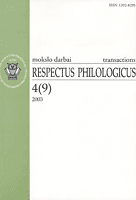Аффрикатизация смычных согласных и палатализация
Affrication of Occlusive Consonants and Palatalization
Author(s): Danutė BalšaitytėSubject(s): Language and Literature Studies
Published by: Vilniaus Universiteto Leidykla
Keywords: distinctive (differentiating) features; phonetic realization; occlusive consonants (stops); duration of explosive phase; palatalization; affricatization; the Lithuanian/Russian languages
Summary/Abstract: The article focuses on one of the possible ways to express the distinctive feature ‘hardness-softness’ in Lithuanian and Russian consonants (the increase in the duration of their explosive phase), i. e. affrication of consonants. The choice of the material and the methodology of the research is determined (i) by the theoretical and practical significance of the problem of how distinctive features of phonemes are phonetically expressed in the related languages and (ii) by the fact that the influence of palatalization on the formation of the stops in Lithuanian has not been studied at large. The carried out contrastive analysis of the spectral properties of the soft and hard stops in Lithuanian and Russian has helped to determine some similarities in the actualization of the occlusive consonants in both languages and to describe the peculiarities in the acoustic expression of palatalization in the spectrum of the Lithuanian stops. Contrary to the Russian language in which palatalization leads to the change in the way of stop formation, viz. to the appearance of the affricative phase, in Lithuanian the regular palatalization can be found only in the labial voiced consonant [b’]. The explosive phase of the palatalized occlusive consonants before various vowels may exceed the duration of the glottal phase of the corresponding hard stop, coincide with it, or may be shorter. In other words, the stops in Lithanian do not differ in ‘hardness-softness’. The Russian stops [t’], [d’] are characterized by the most regular and strong affrication while for the Lithuanian [t’], [d’] the affrication is not regular (only in individual positions) and weak (compared with the back-tongued and labial consonants). Positioned before the backtongued vowels, the Russian consonants are affricated less than before other vowels, while the duration of explosion in the Lithuanian consonants rapidly increases before [’u:].
Journal: Respectus Philologicus
- Issue Year: 2005
- Issue No: 08 (13)
- Page Range: 87-96
- Page Count: 10
- Language: Russian

